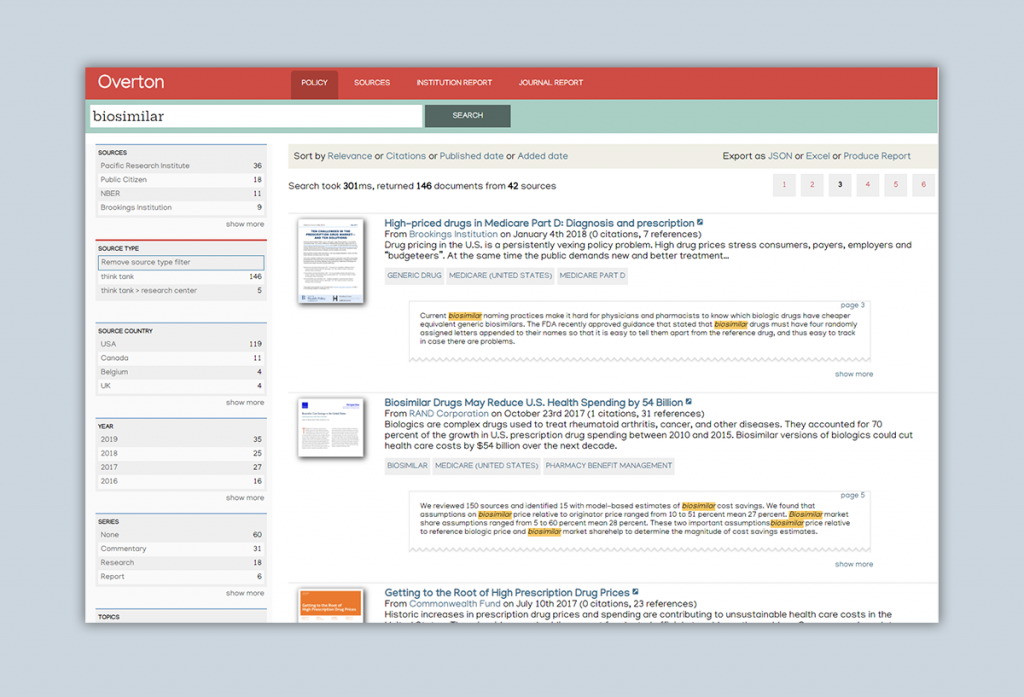Overton.io is the world's largest database of policy documents, their authors - think tanks, NGOs, IGOs and governments - and the research that they cite. We've been developing it quietly with some partners for the past year or so and we're launching it in private beta today - fill out this form for a demo and information on how to access it!
- If you're a university or a funder we can help you see where your research is ending up and give you some tools and reports to help show others the impact that you're having
- If you're a think tank or NGO we can help you find relevant research, potential collaborators and to see where your work is being picked up and potentially acted upon
- If you're a researcher we can help you search, follow and filter how policy is being shaped worldwide
Overton does three things really well: it finds and tracks policy documents (research, briefs, reviews or reports written with the goal of influencing or changing policy in some way), it organizes them by topic and it finds relationships between them and other policy documents, scholarly research and the media.
This means you can search to see what Asian think tanks think about Brexit, or how legislators are being briefed on biosimilars by parliamentary research services, which think tanks cite which newspapers or what the latest thinking about digital service taxes is worldwide.

It also means you can report on the scholarship behind all of these things. For example, Overton shows that the most common citation in policy documents mentioning "biosimilar" is this 2016 paper in the Journal of Health Economics by Hansen et al. from the University of Rochester.
More broadly you're able to see where the evidence, research and background from that particular set of policy documents is coming from. For our biosimilar set we're quickly able to see that:
- Most of the policy documents (75%) are from official sources, rather than think tanks - but two US based think tanks, Public Citizen (who are running a "Fight Pharma Greed" campaign) and the Pacific Research Institute are publishing frequently on the topic, as are health orientated think tanks like the Commonwealth Fund and the Kaiser Family Foundation
- Academic research from academics at the University of Toronto is being cited the most, followed by Harvard and a long tail of other universities
- The GAO (Government Accounting Office) is the most commonly cited policy source, partly because of a recent report on Medicare drug expenditure
- The most commonly cited journal is Health Affairs, followed by the NEJM
- News stories mentioned by policy document authors include NYT pieces on drug price fixing and an Economist story on generics in Mexico
Overton groups sources by country, state and type so it's easy to filter by Connecticut or Canada and to see which papers are being cited where - important when looking for supporting evidence of local or national impact.
Our goal with Overton isn't to tell the complete story of how policy is shaped and the impact it's had: it can't be, the relationship between research, policy documents, policy makers, news and the public is complicated and human interpretation will always be needed. But we can let you spot broad trends, find interesting leads and help you find and fit more pieces of the impact puzzle.
 We're looking forward to sharing it with you, just head over to the form if you'd like to learn more.
We're looking forward to sharing it with you, just head over to the form if you'd like to learn more.[..] Politicians are limited in what policy ideas they can support — they generally only pursue policies that are widely accepted throughout society as legitimate policy options. These policies lie inside the Overton Window. Other policy ideas exist, but politicians risk losing popular support if they champion these ideas. These policies lie outside the Overton Window.
But the Overton Window can both shift and expand...
"A Brief Explanation of the Overton Window" from the Mackinac Center for Public Policy
Join the newsletter
What is Overton
We help universities, think tanks and publishers understand the reach and influence of their research.
The Overton platform contains is the world’s largest searchable policy database, with almost 5 million documents from 29k organisations.
We track everything from white papers to think tank policy briefs to national clinical guidelines, and automatically find the references to scholarly research, academics and other outputs.
